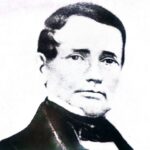NABIEMBALI
- 3 Min Read
Nabiembali (circa 1815-1860), expanded and ruled the Mangbetu state when its power was at its zenith. Located on the Bomolandi River, a tributary of the Uele, about 400 km (250 mi) northeast of what is now Kisangani, the Mangbetu people are Sudanic-speaking groups who penetrated into the forest areas of Zaire before 1800.
Nabiembali was the son of Manzika, the chief who led the Mangbetu people out of the forest and northwest toward the regions they presently occupy. From his youth, Nabiembali distinguished himself in hunting, dancing, and war. He was already highly regarded when he took power in about 1830 after his father died.
Upon coming to power, he quickly extended his domain by conquering a large territory which reached northwest as far as the mid-Uele River at what is now Niangara. Nabiembali, however, is remembered even more for his administrative innovations than for his conquests. A shrewd organiser, he allowed the chiefs of conquered tribes to reign securely under his authority. By allowing a great deal of autonomy to subjected chiefs, he showed much more flexibility than his Zande neighbours to the north. Once they had taken an area, the Zande leaders immediately replaced the chiefs and notables of the conquered populations with their own relatives.
Nabiembali was aware, at the beginning of his reign, that he could not possibly apply the Zande system to his conquests, his family being too small. Later, when his sons, and grandsons increased in number, he shifted to the Zande pattern of placing family members in key offices. Nevertheless, he had prepared for this transition long in advance for, from the start of his reign, after each victory he took a wife from among his new subjects. The children born of these unions were raised in the royal residence. When they grew old enough to govern, Nabiembali appointed them to rule over their mother’s people. While Nabiembali could reasonably expect these new chiefs to be loyal to him, they were usually received with enthusiasm by the local people, who considered them family members rather than usurpers.
Order and peace reigned in Nabiembali’s time, an era marking the height of the Mangbetu power. Later rulers never succeeded in restoring the glory of that age. Nabiembali himself lived long enough to see signs presaging the approaching disintegration. The Mangbetu state had always been a fragile grouping of disparate people. Frequently, ambitious political figures sought support from one or more of the component elements in order to challenge the central government.
During Nabiembali’s own lifetime, and after his death when his sons sought to take power, rivalries, dissensions, murders, and internal wars threatened to destroy Nabiembali’s work. In about 1800, his oldest son, Tuba, dethroned Nabiembali and took power. Although Nabiembali did not long survive these events, before dying he formally disinherited his sons. Then secretly calling his confidant, a young man named Dakpara, he gave him the royal hammer, a symbol of authority and legitimacy.
After Nabiembali’s death the Mangbetu state fragmented-first into two parts, and then into a multiplicity of small chiefdoms, ruled by his many competing sons. Internal forces of division were intensified by the arrival of slave traders from Egypt and the Sudan. These traders profited by supporting one faction against another, thereby gaining the slaves who were generated by the fighting which followed.
TSHUND’OLELA EPANYA SHAMOLOLO





